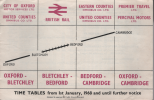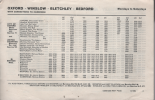I am just young enough to not remember the old Cambridge-Oxford railway (though I do remember passenger trains to St Ives). But that does mean that I can remember what Cambridge was like in 1967.
That image might have had a grain of truth in 1967, but its only relevance now is in TV period dramas.
There is already a sizeable flow by rail between Cambridge and Oxford via London, as shown by the 2023-24 numbers. From the Cambridge end, Oxford is 38th on the flows list, and already ahead of Birmingham. From the Oxford end, Cambridge is 22nd, and already ahead of Basingstoke and Southampton.
No, it is not like that at all.
What matters now for Cambridge-Oxford connectivity is the high tech businesses that have grown up in and around both cities, businesses that did not exist in 1967. Nearly all of them didn't exist in 2007! Cambridge businesses don't just want to meet with Cambridge academics and researchers, they want to meet with Oxford academics and researchers too. Similarly Oxford businesses don't just want to meet with Oxford academics and researchers, they want to meet with Cambridge academics and researchers too. Some of that can be done online, but that does also mean a lot of travelling between Cambridge and Oxford.
And even amongst the academics and researchers there is a lot more collaboration between Cambridge and Oxford. More of that might have happened in the 1960s if the connectivity had not been so poor. Undergraduates won't be a significant part of that, but postgraduates and researchers will.
The commuting will be EWR's bread and butter, but the end to end flow will be important and will be catered for. EWR's expected end to end journey time is about 95-100 minutes, significantly faster than via London now, or via the old Varsity line in 1967, when the 2 "fast" trains in each direction took almost exactly 2 hours. Cambridge-Oxford will be restarting with more end to end journeys than Cambridge-Birmingham or Oxford-Southampton. It will grow rapidly when the line opens and then carry on growing along with economic activity in and around both cities.



